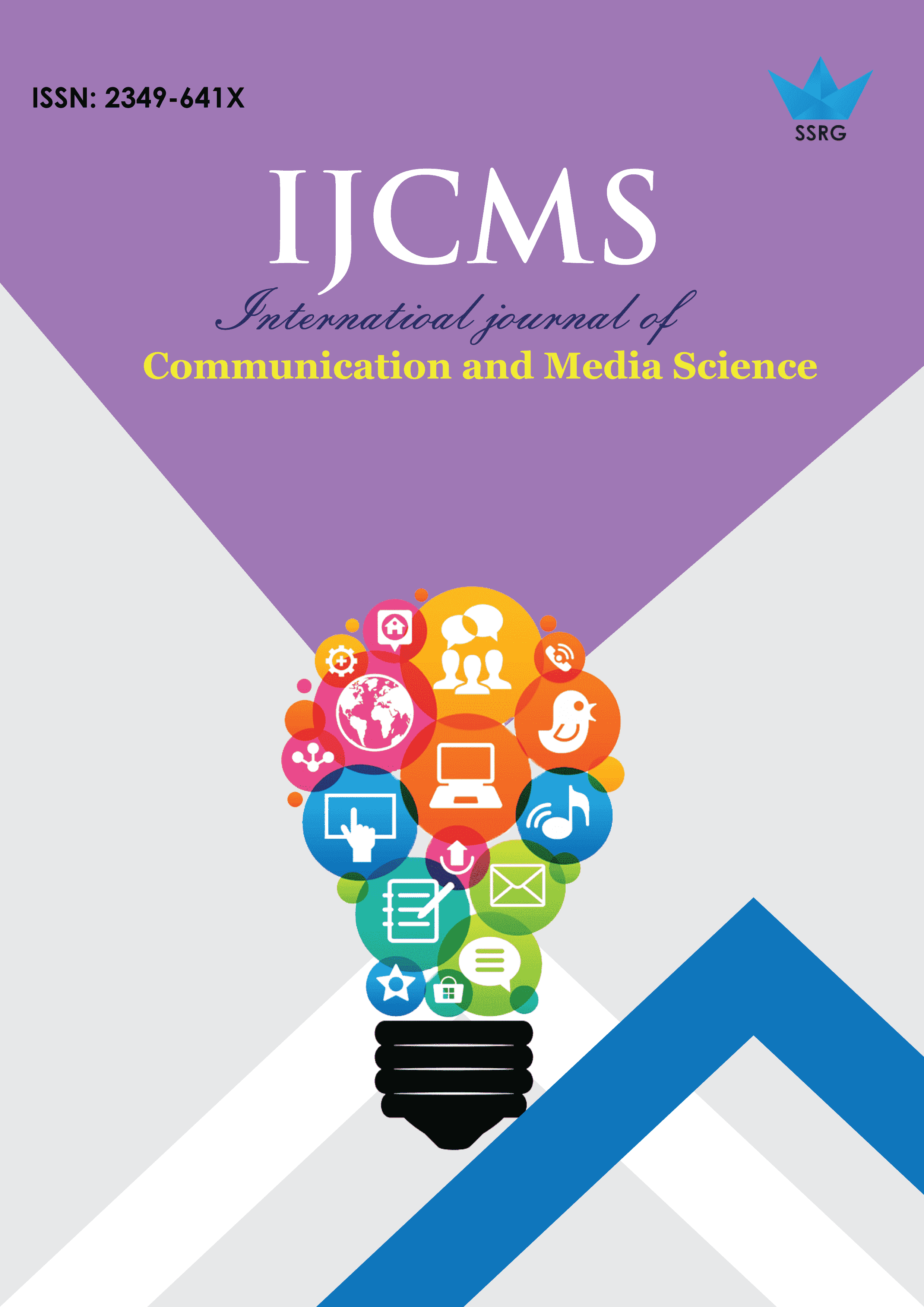Lexical Choices in Conflict Reporting in the Cameroon Print Media: The Post and Cameroon Tribune Reporting of the Anglophone Crisis

| International Journal of Communication and Media Science |
| © 2021 by SSRG - IJCMS Journal |
| Volume 8 Issue 2 |
| Year of Publication : 2021 |
| Authors : Henry Zuyingong Muluh, Fonghe Pascaline Penn |
How to Cite?
Henry Zuyingong Muluh, Fonghe Pascaline Penn, "Lexical Choices in Conflict Reporting in the Cameroon Print Media: The Post and Cameroon Tribune Reporting of the Anglophone Crisis," SSRG International Journal of Communication and Media Science, vol. 8, no. 2, pp. 6-14, 2021. Crossref, https://doi.org/10.14445/2349641X/IJCMS-V8I2P102
Abstract:
This research reviews private and public newspaper articles on the Cameroon Anglophone crisis. The aim was to find out the lexical choices that reporters adopt in reporting the crisis, and how these words and expressions portray the ideologies of the reporters, as well as their impacts on the course of the conflict. Data for this study comprises 54 newspaper editions. Thirty purposefully selected editions of Cameroon Tribune and twenty-four purposeful selected editions of The Post newspaper in Cameroon. The data come from the news, commentaries, and human-interest stories of the selected newspapers. The units of analysis are verbs, adjectives, adverbs, pronouns, and nominalizations. Critical Discourse Analysis was used to detect the different language styles used in reporting conflict, and the conceptual frames were language and conflict, conflict reporting, and lexical choices. Results show that words explicitly and implicitly carry different shades of meaning, and the way the writer presents them would escalate or deescalate conflict. The use of exclusive and inclusive pronouns (we, us, our versus they, them, and their) revealed that social actors are excluded from what they considered to be theirs, and this was liable to stir them to revolt, thus escalating the conflict. The results also revealed that writers use nouns, especially from the processes of nominalization, to distort and manipulate the truth in pursuit of specific interests. It is therefore recommended that reporters, when reporting sociopolitical crisis, should make less emotive lexical choices. They should also strive to be objective in reporting and have an ideology to promote peace rather than to instill upheaval.
Keywords:
language, conflict, Anglophone crisis, lexical choice.
References:
[1] Chafe, W., Integration, and involvement in speaking, writing, and oral literature. InDeborah Tannen, (ed.), Spoken and Written Language: Exploring Orality and Literacy, Norwood, NJ: Ablex., (1982) 35–53.
[2] Fairclough, N., Language, and power. New York: Longman.,(1989).
[3] Fairclough, N., Discourse and Social Change. Cambridge: Polity Press.,(1992b)
[4] Fairclough, N., Critical Discourse Analysis: The Critical Study of Language. London: Longman.,(1995).
[5] Fanso, V.G,. Anglophone and Francophone Nationalism in Cameroon: The Round Table,350 (1996) 281- 196
[6] Fowler, R., Language in the News: Discourse and Ideology in the Press. London: Routledge.,(1991).
[7] Hall, D. & Hall, I., Practical Social Research: Project work in the Community, London: Macmillan Press Ltd.,(1996).
[8] Halliday, M. A. K., An Introduction to Functional Grammar. London: Edward Arnold., (1985).
[9] Hansen, A., Researching ‘Teachers in the News’: The Portrayal of Teachers in the British National and Regional Press. In W. Rosemary (ed.), Researching Primary Education: Methods.,(2010)27 – 39. New York, Routledge.
[10] Hayakawa, S. I., Language in Thought and Action (4thed.). New York: Harcourt Brace Jovanovich. , (1978).
[11] Jija, T., Language as a Tool for Conflict Management and Resolution. Journal of Igbo Language and Linguistics 5 53-86.
[12] Lynch, J. &McGoldrick A., (2012)(2005). War and peace journalism in the Holy Land. Social Alternatives 24(1) 11–15.
[13] Merill, J. C., The Image of the US in Ten Mexican Dailies. Journalism Quarterly, 39 (1965)203-209.
[14] Mojaye, E. M., Language and Communication for Domestic Conflict Resolution in Nigeria. New Media and Mass Communication.www.iiste.org ISSN 2224-3267 (Paper) ISSN 2224-3275 (Online) 31(27) (2014) Retrieved on 16th June 2018.
[15] Nkongho, A. F., The Cameroon Anglophone crisis: Examining the escalation and seeking a solution. In Proceedings of the African Programme Meeting Summary. London: Chathem House, (2017)3-4.
[16] Nnamani, A.P., Fostering peace and national development: The role of the English language. Conference Proceedings of School of Education: Federal College of Education Eha-Amufu., (2012).
[17] Nyamnjoh, B. F. &Konings, P., Negotiating an Anglophone Identity: A Study of the Politics of Recognition and Representation in Cameroon. The Netherlands: Brill Leiden.,(2003).
[18] Pisarek, W., Reality East and West.In Language, image, media. In H. Davis,& P. Walton (eds.) (1983) 156-164. Great Britain: Basil Blackwell.
[19] Richardson, J.E., Analysing Newspapers: An Approach from Critical Discourse Analysis.Basingstoke: Palgrave Macmillan., (2007).
[20] Sapir, E., Language – An Introduction to the Study of Speech. New York: W.W. Norton &Company.,(1963).
[21] Schmid, A. P., Thesaurus and Glossary of early warning and conflict prevention terms. Pioom Netherland: Leiden.,(2002).
[22] Tita, C. J., Tanjong, E., Wantchami, L. N., Tabuwe, E.M. and Bisong, D. E., Nexus of Conflict Reporting: Analysis of Cameroon newspaper coverage of Cross border conflicts. Journal of the Cameroon Academy of Sciences, 13 (1&2) (2016)51-62.
[23] The Longman Dictionary of Contemporary English (1995). London: Longman Publishers
[24] Van Dijk, T. A.,News as Discourse. Hillsdale, NJ: Erlbaum., (1988a).

 10.14445/2349641X/IJCMS-V8I2P102
10.14445/2349641X/IJCMS-V8I2P102